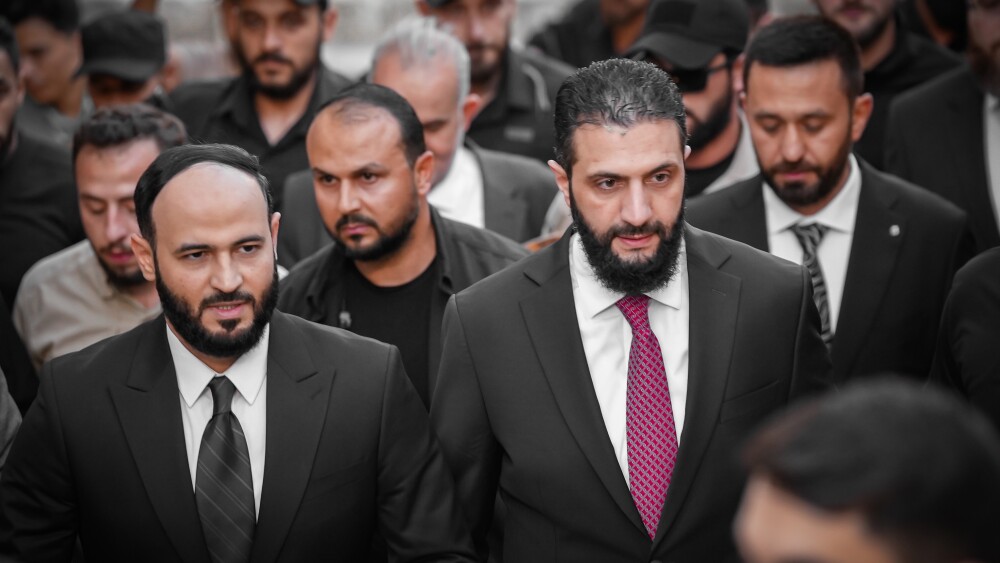For the first time in decades, Syria has remained on the sidelines of a conflict involving Israel and Iran. Rather than targeting sites in Damascus or Aleppo, Israeli fighter jets are now reportedly even refueling over eastern Syria and striking deep inside the Iranian heartland.
One key reason for this is that Syria no longer has a government closely allied with Iran’s clerical regime. Following the fall of President Bashar al-Assad’s regime in December 2024, the new Sunni Islamist leadership severed ties with Iran, even banning Iranian citizens from the country.
Pundits on Syrian state media discuss the flareup as a distant development, making it clear to their audience that Syria has no stake in this conflict.
The Israeli strikes on Iran—and Iran’s retaliatory ballistic missile attacks on Israel—elicited no response from Damascus, not even a formal statement regarding the situation. Pundits on Syrian state media discuss the flareup as a distant development, making it clear to their audience that Syria has no stake in this conflict. This represents a strategic move, signaling a deliberate effort by Syria’s new rulers to distance the country from entanglement in regional conflicts.
For decades, Syria was a key member of Iran’s so-called axis of resistance, placing it at the forefront of Tehran’s regional ambitions. This alignment came at a high cost for the country and its people, particularly during the fourteen-year civil war, when Syria became a battleground for competing foreign agendas. Given its geographic location, Syria also served as a key conduit for transferring weapons to Tehran’s other regional proxies, particularly Hezbollah. This role made Assad’s Syria a frequent target of Israeli attacks aimed at curbing Iran’s expanding influence across the region.
This current conflict between Israel and Iran highlights the importance of maintaining post-Assad Syria’s neutrality in geopolitical affairs. However, this doctrine of nonalignment—if one indeed exists in Damascus—should also apply to Syria’s relations with other regional powers, particularly Turkey.
Turkey played a pivotal role in facilitating the rise of the Islamist-led government in Damascus, making it clear that Ankara intends to exert excessive influence over the new Syrian regime. While Turkey will remain an important neighbor and regional actor, Syria’s ability to recover and stabilize mandate that Turkey not be allowed to assume the kind of patron-client relationship that the Iranian regime once held with the Assad government.
Upon assuming power, Syria’s interim President Ahmed al-Sharaa pledged to prioritize reconstruction and development, signaling a desire to shift away from regional entanglements. However, the success of this vision will depend on his ability to assert national agency and resist direct Turkish influence over Syria’s political trajectory.
The success of [President al-Sharaa’s] vision will depend on his ability to assert national agency and resist direct Turkish influence over Syria’s political trajectory.
Under a Sunni-dominated leadership, Syria already has moved away from the dominance of Shi’ite Iran. While distancing itself from Sunni-majority Turkey—especially under Islamist leadership—may be more challenging, Syria at the least must avoid becoming a foothold for Turkey’s regional ambitions. Beyond sectarian and ideological connections, Turkey is emerging as one of the largest foreign investors in post-Assad Syria, with significant involvements in the energy, defense, and transport sectors.
While it is unrealistic to expect Syria to completely disengage from Turkey, it remains possible—and necessary—to maintain a balanced relationship between the two countries. Aligning Syria more closely with the Persian Gulf countries, namely Saudi Arabia and the United Arab Emirates, could be one way to help maintain that balance. This is especially true if these countries engage in Syria’s post-conflict reconstruction efforts.
Despite reportedly opening communication channels with Israel, a full-fledged peace agreement remains an unlikely prosect for Syria in the near term. But maintaining a neutral stance toward its neighbor—and other regional actors—could help spare the country from conflicts it is neither prepared nor willing to engage in. After years of civil war and decades under authoritarian rule, Syria can ill afford a return to hostility with Israel. It must prioritize stability, good governance, and reconstruction over ideological confrontations.








